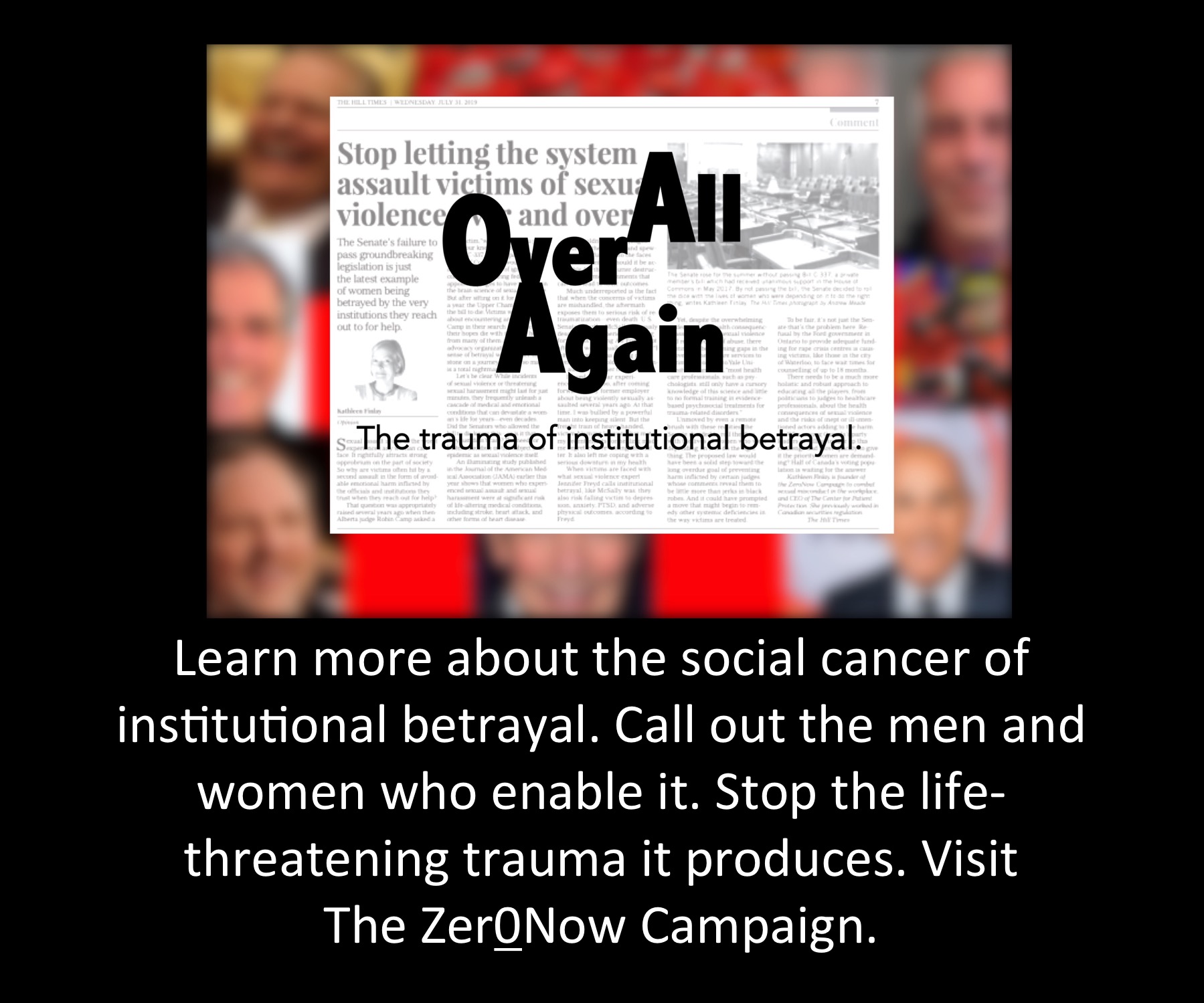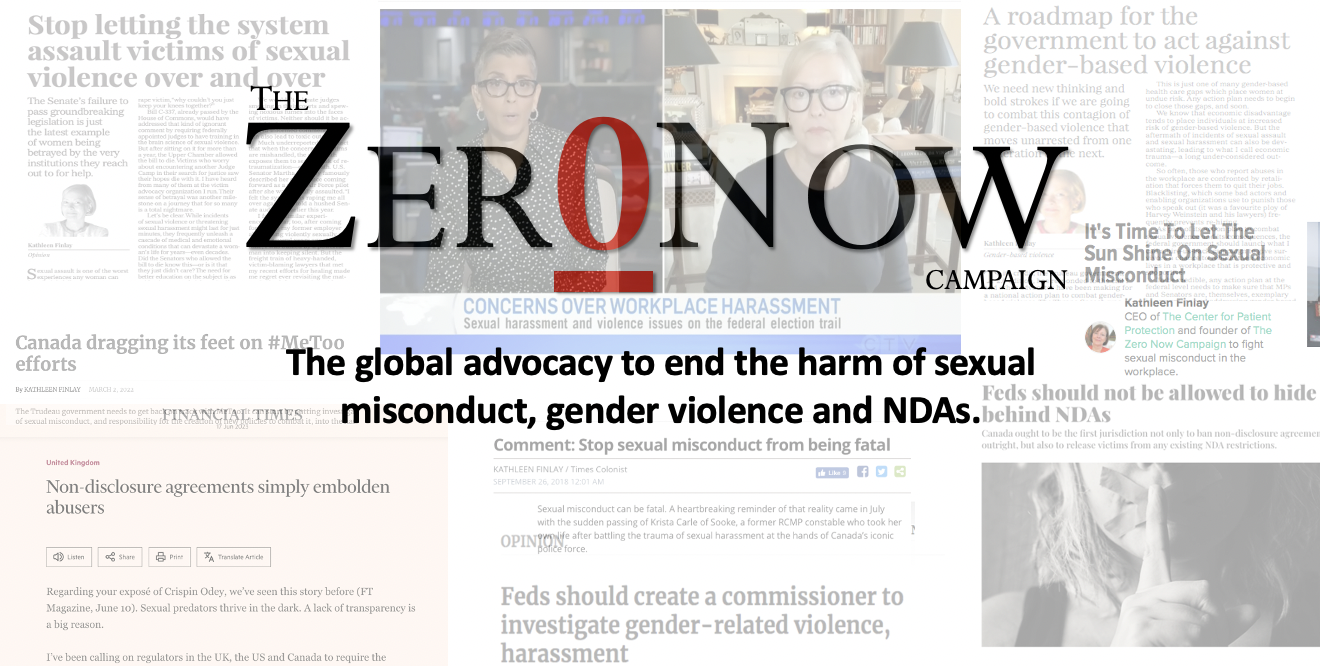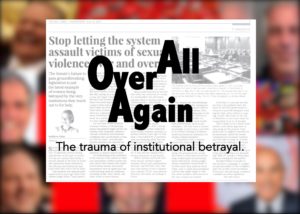
When an institution that we believe should support and protect us – a government, a religious organization, an academic institution – fails to prevent or respond supportively to wrongdoings committed within the group, that’s a significant betrayal that’s hard to digest.
Joan Cook, PhD
Yale School of Medicine
ENDING INSTITUTIONAL BETRAYAL
In 2010, 19-year-old college freshman Lizzy Seeberg died by suicide 10 days after being sexually assaulted by a University of Notre Dame football player. The mishandling of the assault by authorities and the university, which appeared to value a so-called football star over an abused first-year student from another university, caused her to slip into a deep depression. Following Lizzy’s tragic death, her family faced a life tormented by the university’s inept and insensitive response.
In 2013, Frances Andrade, an accomplished U.K. violinist, took a fatal overdose after learning the jury in the trial of the man who sexually abused her was instructed by the judge to find not guilty verdicts for several charges.
In 2018, former RCMP constable Krista Carle took her life after coming forward about repeated incidents of sexual misconduct while she was an active officer. The impact of those incidents was brutally magnified by the RCMP’s mishandling of her concerns, which caused her to develop PTSD, a common occurrence for victims of institutional betrayal.
Every day, we see more shocking evidence of how sexual assault and sexual harassment are destroying careers and devastating lives. Worse, too many victims are often hit by a second assault in the form of avoidable emotional harm inflicted by the officials and institutions we trust when we reach out for help. Knowing that can happen is a huge reason why most women never report these abusive events in their lives. Demanding zero tolerance now for institutional betrayal, which too often protects perpetrators by perpetuating a culture of fear and silence, is a necessary step in ending the epidemic of sexual trauma itself.
Sexual violence and sexual harassment are generally inflicted by a perpetrator acting alone, and are often crimes of opportunity that are unplanned. What makes institutional betrayal so toxic, and sometimes even more traumatic than the original incident(s) of abuse, is that it is the product of the purportedly rational mind of the corporate or organizational entity, acting in a deliberate and premeditated fashion, frequently with the approval of an eminent and respected board of directors or governing body and with legal counsel at their side. It is because this second wave of harm is so typically the result of deliberate efforts by the collective mind of a trusted organization that it takes on a level of perversity all its own.
When a single actor hurts you, it’s bad enough. Sometimes it can be attributed to the “bad apple” theory of human behavior. But when an entire organization goes against you in order to protect its own reputation, or the status of the perpetrator it still highly values, it’s like you’ve been hit by the whole rotten tree. As a report into the culture of abuse at giant broadcaster CBS found, “when faced with instances of wrongdoing, the company had a tendency to protect itself, at the expense of victims.” How many times has that paradigm of betrayal been played out to the utter devastation of a victim’s reputation, peace of mind, health, career and even life? How many times will it be enacted before society stands up against these well-protected monsters of institutional betrayal? How many times must a victim be assaulted again?
The perversity of betraying players can be staggering. It often occurs at the hands of celebrated and highly valued organizations, including universities, the military, publicly listed corporations, churches, healthcare institutions, the legal system, law enforcement agencies and government bodies. When they act out in a way that harms victims, experts — like the acclaimed psychologist Jennifer Freyd, PhD, who coined the term “institutional betrayal” — warn that the damage caused can be as profound and as toxic as the harm from the original incident. Many victims say this betrayal experience is like being assaulted all over again.
The DNA of institutional betrayal has been left at the crime scenes of countless shattered lives. In the case of sexual violence, it has been directly linked to the suicide of Lizzy Seeberg, a 19-year-old college freshman, and Krista Carle, once a brave member of the famed Royal Canadian Mounted Police, and who, as a victim of sexual violence, could not escape the dark clouds of betrayal in the way it was mishandled.
In some of the scandal-screaming headlines that have defined the #MeToo era, top organizations like the RCMP, CBS, NBC and the U.S. and Canadian militaries have been witting accomplices in compounding the wrong inflicted on victims. Working for his high-paying client Harvey Weinstein, famed defense lawyer David Boies was dispatched to hire the private investigators, including ex-Mossad agents, whose job it was to dig up dirt to intimidate, discredit and silence the predator’s accusers.
Other organizations, like the Ontario Securities Commission and Ernst & Young, continue to inflict harm knowingly, and in plain sight. Today. Even a powerful man who heads a government, like Ontario Premier Doug Ford, can be part of the betraying machine that enables wrongdoing in order to muzzle a victim and hide embarrassing truths.
As Yale’s Joan Cook notes in an exclusive interview with Zer0Now founder, Kathleen Finlay “Without a doubt, institutional betrayal deepens and widens a survivor’s pain and makes it harder for women to recover from traumatic exposure.”
 If we want to end sexual violence and sexual harassment, we need to end the culture of betrayal, retaliation and silence that too often descends upon women who speak out. No woman should ever be disrespected, threatened or gagged because she stood up against injustice and wrongdoing. And no victim of sexual violence should have to pay with her job, career, dignity, health or peace of mind because she came forward.
If we want to end sexual violence and sexual harassment, we need to end the culture of betrayal, retaliation and silence that too often descends upon women who speak out. No woman should ever be disrespected, threatened or gagged because she stood up against injustice and wrongdoing. And no victim of sexual violence should have to pay with her job, career, dignity, health or peace of mind because she came forward.
The Zer0Now Campaign™ empowers women in the workplace, in the community and on the campuses in standing against the forces of institutional betrayal that enable harm to continue. We are the only advocacy to adopt this goal as a core part of our mission. It needs to be a crucial focus for the next #MeToo chapter. Want to help? Contact The Zer0Now Campaign™.
Since starting to write and comment on institutional betrayal and related issues, Zer0Now™ has been inundated with stories from victims. We have also heard from clinical professionals and academics who have been generous enough to share their observations and experiences. If you have a story you’d like to share, always in complete confidence, please contact us here.
RELATED:
Stop Letting the System Assault Victims of Sexual Violence Over and Over
(Op-ed, The Hill Times)

